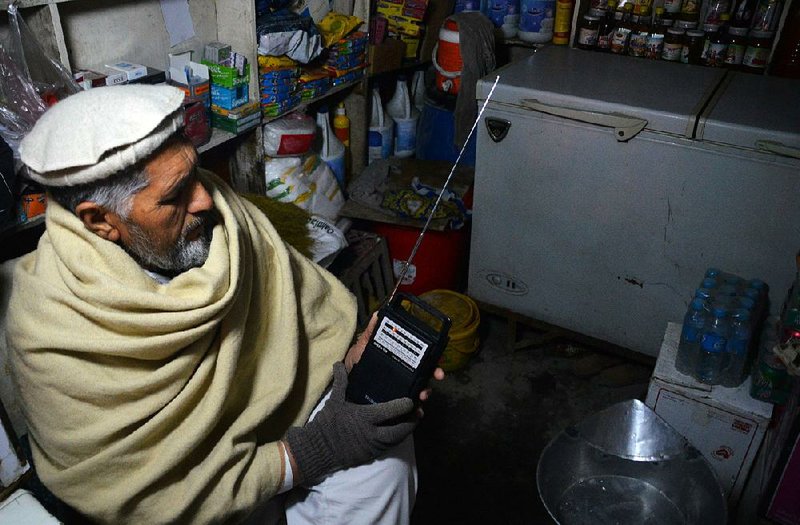KABUL, Afghanistan -- The Afghan reporters recognized the voice threatening them with death on the Islamic State's radio station. It was a former colleague, who knows their names and where they work.
The threats were made during a discussion program on Voice of the Caliphate, an elusive radio station operated by one of the extremist group's newest affiliates. The group, the Khorasan Province, has battled Afghan forces and the Taliban alike, carving out an enclave in Nangarhar, a rugged eastern province bordering Pakistan.
It has adopted the media strategy of its parent organization in Syria and Iraq, including the production of professionally made videos showing battles and the killing of captives. But in Afghanistan, where few have access to the Internet, radio proves more effective at recruiting fighters and silencing critics.
The group is actively targeting other media outlets to prevent them from competing with its chilling broadcasts. Militants bombed a building housing two radio stations in the provincial capital, Jalalabad, in October, and attacked the offices of the independent Pajhwok news agency and Voice of America in July.
The broadcast in mid-December, in which a former local radio broadcaster called on reporters to either join the Islamic State or risk being hunted down and killed, could be heard across Jalalabad.
"It is a great concern for us because he knows all the journalists who are working locally," said Shir Sha Hamdard, chairman of the Journalists' Union of Eastern Afghanistan.
"He also knows that as journalists we do not take sides and that our only weapon is the pen. We've tried to talk to representatives of the Islamic State to make sure they know this but we haven't been successful," he said. He and other Jalalabad-based reporters asked that the Islamic State broadcaster not be named for their own safety.
The Islamic State radio can be heard across Nangarhar on an FM frequency for 90 minutes a day in both the Pashto and Dari languages. Programs include news, interviews, vitriol against the Afghan government and the Taliban, recruitment propaganda, and devotional music in multiple languages.
The message is clear: the Afghan government is a doomed "puppet regime" of the U.S. The Taliban are a spent force hijacked by Pakistan. The caliphate is coming.
"Soon our black flag will be flying over the [presidential] palace in Kabul," an announcer said in a recent broadcast.
The Islamic State affiliate "is against everything -- free media, civil society, education, all of which they say are secular, un-Islamic," said Haroon Nasir, a civil-society activist in Nangarhar. He said the message likely resonates among young men in impoverished rural areas, where after nearly 15 years of war many have soured on both the U.S.-backed government and the Taliban.
In those areas -- which make up most of Afghanistan -- Internet access is spotty at best, and computers and smartphones are a luxury. Just 10 percent of Afghanistan's 30 million people have access to the Internet.
But nearly everyone has a radio.
A 2014 study by Altai Consulting found that 175 radio and 75 television stations had been set up since the 2001 U.S.-led invasion that toppled the Taliban -- which had one radio network and banned television. Wind-up radios that operate without electricity or even batteries have been widely distributed since then.
Islamic State militants are believed to use mobile broadcasting units and cross back and forth along the porous border with Pakistan, making them difficult to track. The National Directorate of Security, the Afghan intelligence agency, did not respond to requests for comment.
Hazrat Hussain Mashriqiwal, the spokesman for the Nangarhar police chief, said Voice of the Caliphate broadcasts had been banned and were rarely picked up, especially in Jalalabad.
But residents tell a different story. Jalalabad shopkeeper Janat Khan said Islamic State radio is popular chiefly because of its novelty. "Most people are listening to them because they want to know about Daesh and its strategy," he said, referring to the extremist group by its Arabic acronym. "The preachers are strong; their message is clear -- they talk against the Taliban and against [President Ashraf] Ghani's government."
Although the Islamic State and the Taliban both want to impose a harsh version of Islamic rule, they are bitterly divided over leadership and strategy, with the Taliban narrowly focused on Afghanistan and the Islamic State saying it wants a worldwide caliphate.
The U.S. State Department recently added the Islamic State's Afghan affiliate to its list of foreign terrorist organizations. It said the group emerged in January 2015 and is mainly made up of disenchanted former Taliban fighters.
Information for this article was contributed by Humayoon Babur of The Associated Press.
A Section on 01/22/2016

